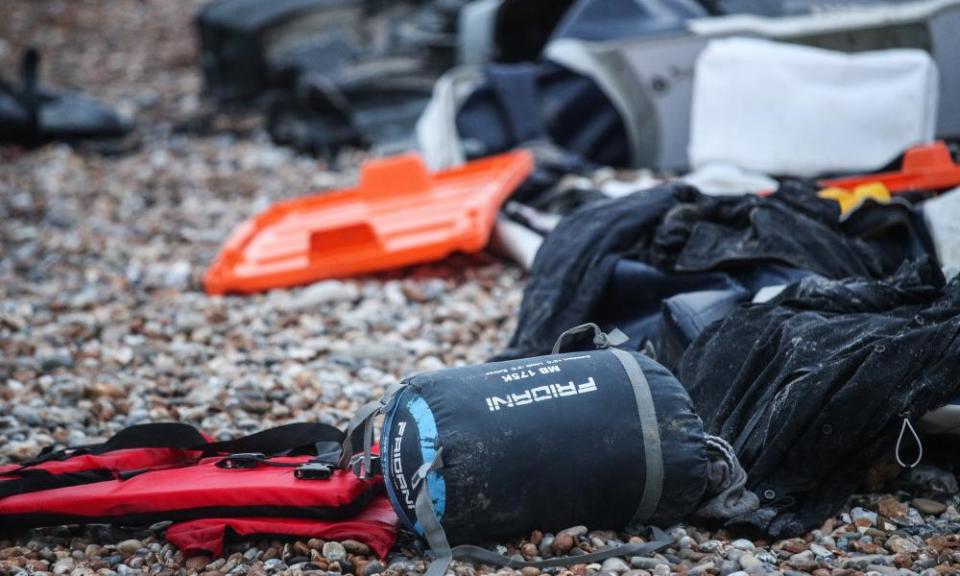Pregnant woman and three children among 27 drowned in Channel

At least one pregnant woman and three children were among the 27 people, mostly Kurds from Iraq or Iran, who drowned trying to cross the Channel in an inflatable boat, French authorities have said.
Two male survivors, an Iraqi and a Somali, were being treated for exhaustion and hypothermia in a Calais hospital. A criminal investigation has been opened by the public prosecutor in Lille, with four men suspected of “direct involvement” in the attempted crossing arrested on Wednesday and a fifth detained early on Thursday morning.
The bodies were brought into the port of Calais by boat and helicopter through the evening, where volunteers with local migrant aid associations lit candles and held aloft placards reading “How many more?” after what the International Organization for Migration described as the biggest single loss of life in the Channel since it began keeping records in 2014.
The public prosecutor’s office in Lille has confirmed that 17 men, seven women and three adolescents – two boys and a girl – died in the disaster. “Examinations are being carried out this morning,” a spokesperson said. It said the lives of the survivors were not in danger.
The French interior minister, Gérald Darmanin, told RTL radio that the fifth suspect had been driving a car with German number plates and had “bought inflatable boats in Germany”. He said 1,500 suspected people smugglers had been arrested in France since the beginning of the year.
“The main responsibility for this situation lies with the smugglers,” Darmanin said, describing them as “mafia-like organisations in Belgium, the Netherlands, Germany and Britain”, adding: “France and Britain have to work together. We can no longer be the only countries to be fighting these smugglers.”
Related: The horrific Channel deaths show the UK needs a more humane asylum system | Enver Solomon
Darmanin also renewed his criticism of Britain’s refugee policies. “France expels about 20,000 illicit migrants a year,” he said. “Britain manages 6,000 – about four times less than France, despite the fact that the UK gets about half as many illicit migrants. The UK does not handle illicit migration well.”
French media said the inflatable boat, carrying at least 29 people, was believed to have set off from Loon-Plage near Dunkirk and that they had most likely been camping out in the dunes near Grande-Synthe, the location of several migrant camps. The largest, home to about 1,500 people, was dismantled last week.
Winds were light and the sea was calm at the time, prompting unconfirmed reports in several media including La Voix du Nord newspaper that the boat was either hit by a container ship in one of the world’s busiest shipping lanes or had folded under the weight of its occupants, possibly after hitting the wake of a larger vessel.
The first alarm was sounded at about 2pm by a French fishing boat that spotted bodies in the water off the coast of Calais, with French sea rescue services arriving on the scene soon after. “The boat was found mostly deflated but was still floating,” Bernard Barron, the head of the Calais lifeboat service, told reporters. The people were recovered from the water, where the temperature was estimated to be 17C, he said.
The head of the Dunkirk lifeboat service, Alain Ledaguenel, said the disaster was predictable. “It had to happen, and it happened,” he said. “We know that the means available for sea rescue are inadequate.”
French police said on Thursday morning they had come to the assistance of 20 people on Wednesday night. “Their boat was overloaded and rapidly began taking in water, forcing its occupants to return to the beach,” a tweet said. “Police officers immediately went to their assistance.”
The French prime minister, Jean Castex, was holding a crisis meeting on Thursday with six cabinet colleagues including Darmanin, the justice minister, Éric Dupond-Moretti, the maritime affairs minister, Annick Girardin, the transport minister, Jean-Baptiste Djebbari ,and the foreign affairs minister, Jean-Yves Le Drian.
The Elysée palace said in a statement on Thursday that Emmanuel Macron had “informed Boris Johnson in a telephone call” that he “expected full cooperation from Britain and [to] stop instrumentalising a dramatic situation for political ends”.
The French president “insisted on the need to act with dignity, and respecting the spirit of effective cooperation concerning human lives”. The two countries’ interior ministers would be discussing the matter during the day, the statement said.
Another body was found on the northern French coast on Thursday, according to La Voix du Nord, though it was not thought to be linked to Wednesday’s tragedy as it had spent more than 24 hours in the water.

 Yahoo News
Yahoo News 